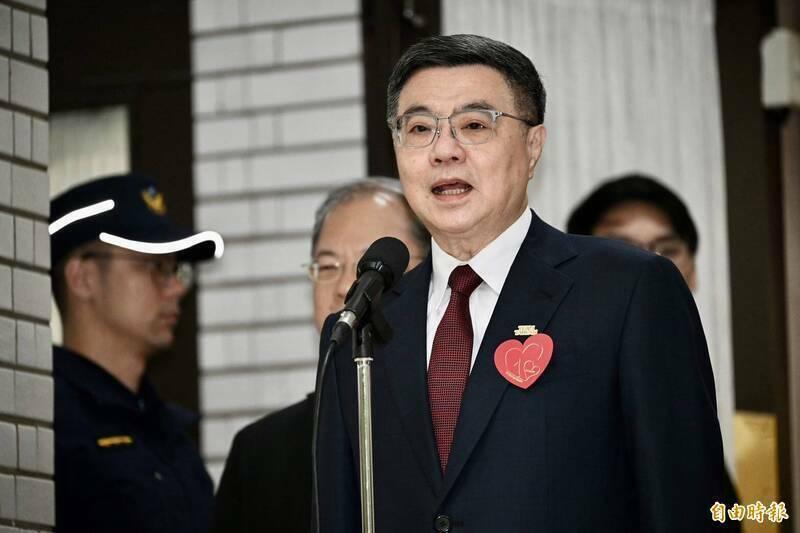Taiwan has and would continue to improve its combat capabilities and procure military equipment based on its own national defense requirements, high-ranking government officials said today.
The statements came in response to an article by Nikkei Asia that said US President Donald Trump might pressure Taiwan into buying more weapons to make up for the trade imbalance between the two nations.
Taiwan is a sovereign and independent country that has improved its combat capabilities based on its own national defense needs, not due to pressure from other countries, Premier Cho Jung-tai (卓榮泰) said.

Photo: Lo Pei-de, Taipei Times
“If there is any [pressure], it is that we must strengthen ourselves to face the threat of China,” Cho said.
Taiwan would consider how to enhance the combat capabilities of its military based on its need for self-reliant national defense, he said.
It would also monitor the national financial situation while purchasing advanced military weaponry from other countries to upgrade its self-defense capabilities, he added.
There are two types of peace: one is when we are strong enough and the other is if we surrender, Cho said.
We choose to make Taiwan a stronger country, he said.
The US has never purposefully sold Taiwan weapons that were not for defensive operations, but both sides have discussed what equipment is practical, Minister of National Defense Wellington Koo (顧立雄) told reporters at the Legislative Yuan in Taipei.
The government is procuring weapons to maintain peace in the Taiwan Strait and to deter war through strength, which is a common interest with the US, Koo said.
The approach is to increase defense spending by 3 percent of GDP based on defensive needs and the nation’s fiscal capacity, he said.
Combat readiness preparations are not solely about procuring weapons, but also about operational and maintenance costs, Koo said.
The Ministry of National Defense also goes through various channels to purchase domestically produced equipment, he said.
Meanwhile, other senior military officials said that the troop strength of the nation's military was previously reviewed on a five-year basis.
However, in the past few years the military has procured new equipment, established new units and reinstated the one-year mandatory service requirement, which means greater flexibility regarding deployments are needed, the officials said.
Military strength reviews would be conducted annually through a “rolling assessment” approach, they said.
The military has maintained a force of 215,000 troops for the past 10 years and this would be increased based on the annual reviews, they said.
The number of officers has also been slightly increased from 292, but would be kept under 300, they added.

Authorities have detained three former Taiwan Semiconductor Manufacturing Co (TMSC, 台積電) employees on suspicion of compromising classified technology used in making 2-nanometer chips, the Taiwan High Prosecutors’ Office said yesterday. Prosecutors are holding a former TSMC engineer surnamed Chen (陳) and two recently sacked TSMC engineers, including one person surnamed Wu (吳) in detention with restricted communication, following an investigation launched on July 25, a statement said. The announcement came a day after Nikkei Asia reported on the technology theft in an exclusive story, saying TSMC had fired two workers for contravening data rules on advanced chipmaking technology. Two-nanometer wafers are the most

Tsunami waves were possible in three areas of Kamchatka in Russia’s Far East, the Russian Ministry for Emergency Services said yesterday after a magnitude 7.0 earthquake hit the nearby Kuril Islands. “The expected wave heights are low, but you must still move away from the shore,” the ministry said on the Telegram messaging app, after the latest seismic activity in the area. However, the Pacific Tsunami Warning System in Hawaii said there was no tsunami warning after the quake. The Russian tsunami alert was later canceled. Overnight, the Krasheninnikov volcano in Kamchatka erupted for the first time in 600 years, Russia’s RIA

CHINA’s BULLYING: The former British prime minister said that he believes ‘Taiwan can and will’ protect its freedom and democracy, as its people are lovers of liberty Former British prime minister Boris Johnson yesterday said Western nations should have the courage to stand with and deepen their economic partnerships with Taiwan in the face of China’s intensified pressure. He made the remarks at the ninth Ketagalan Forum: 2025 Indo-Pacific Security Dialogue hosted by the Ministry of Foreign Affairs and the Prospect Foundation in Taipei. Johnson, who is visiting Taiwan for the first time, said he had seen Taiwan’s coastline on a screen on his indoor bicycle, but wanted to learn more about the nation, including its artificial intelligence (AI) development, the key technology of the 21st century. Calling himself an

South Korea yesterday said that it was removing loudspeakers used to blare K-pop and news reports to North Korea, as the new administration in Seoul tries to ease tensions with its bellicose neighbor. The nations, still technically at war, had already halted propaganda broadcasts along the demilitarized zone, Seoul’s military said in June after the election of South Korean President Lee Jae-myung. It said in June that Pyongyang stopped transmitting bizarre, unsettling noises along the border that had become a major nuisance for South Korean residents, a day after South Korea’s loudspeakers fell silent. “Starting today, the military has begun removing the loudspeakers,”